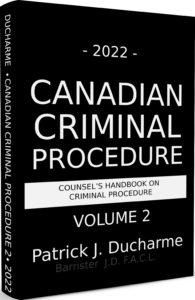 |
| Patrick J Ducharme |
When we speak of relevant evidence we are speaking not just about whether there is a logical connection between the evidence and the fact in issue, but also, whether on an evaluation of the evidence, it is sufficiently probative to justify its admission despite whatever prejudice might flow from its admission. Consequently, trial Judges have discretion to exclude relevant and material evidence in circumstances where its probative value is outweighed by its prejudicial effect.
Logically relevant evidence may be excluded by the exercise of judicial discretion even in the absence of an exclusionary rule requiring its rejection. In previous decades, trial Judges exercised their discretion in a much more controlled way, generally following prescribed rules and categories of exclusion. We are now, however, in an era of increasing discretion. Our trial Judges perform the vital role of evaluating evidence as a prelude to admissibility. The Supreme Court of Canada’s decisions of more recent vintage seem to recognize more grounds for discretion in the admission or exclusion of evidence based on relevancy.
Trial Judges, for example, may exclude evidence obtained in circumstances such that it would result in unfairness if the evidence was to be admitted. Some believe that this discretion is founded on the wording of section 24 of the Charter, which permits the exclusion of evidence that is unfairly or illegally obtained.
Section 24 of the Charter permits Judges to consider “all the circumstances,” in determining whether or not the admission of the evidence would bring the administration of justice into disrepute. Another form of discretion is more closely linked to questions of relevance. For example, Sopinka J. in Mohan1 referred to the cost-benefit analysis of evidence, effectively advising lower courts to consider whether the admissibility of the evidence demonstrates its value over the cost of admission. There now exists a rich body of case law that suggests our courts have the discretion to exclude any evidence, even technically admissible evidence where its prejudicial value (its cost) outweighs its probative value (its benefit).
So, Judges may even exclude evidence that satisfies all the statutory rules of admissibility if they come to the conclusion that the admissibility of such evidence would be overly prejudicial. The admission of evidence from prior testimony (s. 715), videotaped statements by children about sexual offences (s. 715.1) and evidence related to prior convictions of a witness (s. 12 Canada Evidence Act) may be excluded, even if all the prerequisites of those statutory provisions are met provided the trial Judge believes that the prejudicial value of the evidence outweighs its probative value.
In most cases, however, there will be no rule of exclusion to consider in determining admissibility. In these circumstances the appropriate standard of admission of the evidence is that the evidence is relevant and advances the court’s consideration of the issue at hand. In other words, evidence to be admissible must be relevant. In the event of a dispute as to whether or not any evidence, absent some rule of exclusion, is relevant, the dispute will be decided by the trial Judge simply determining whether the evidence is worth hearing in order to answer a material issue in the case.
Only the actual evidence heard at trial will ever be relevant. Jurors, for example, are instructed that they must disregard completely any radio, television, newspaper accounts or Internet information they may have heard, seen or read prior to or during the case. Because that information is not tested by the scrutiny of cross-examination, they are told it would be unfair to decide a case on the basis of such untested information.
The concept of relevance is also dependent upon decision-makers who are unbiased, impartial, calm, objective arbiters of the evidence. Consequently, jurors are told that they must consider the evidence. Their decisions are expected to be delivered without sympathy, prejudice, or fear. They must not be influenced by public opinion. We expect that our jurors will be instructed and educated to do likewise. In the style of our best Judges, jurors will be expected to be impartial assessors of the evidence.

The above is the an excerpt of Patrick J Ducharme's book, Canadian Criminal Procedure Volume 2, available at Amazon or in bulk through MedicaLegal Publishing along with Criminal Trial Strategies.
Subscribe to Patrick Ducharme's Youtube Channel
